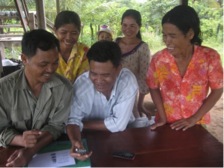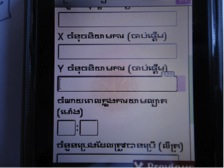Here is the latest FrontlineSMS newsletter, updating our community on recent activities and upcoming events. You can check out all the news below, and sign up to receive our e-newsletter directly on the right hand side of the screen.
FrontlineSMS Version 2 Global Launch!
We are excited to announce that we will be releasing FrontlineSMS Version 2 on June 12th 2012. Two years in the making, and built upon extensive input and feedback from our users around the world, this new version of our software is a significant step forward – easier and more intuitive to use, more versatile, and capable of being more easily extended with new functionality.
FrontlineSMS Version 2 will be launched at three events on three continents – in Nairobi, Kenya and Washington, D.C. on the 12th June, and in London, UK on the 18th June. Find out more and sign up to attend these events here, and keep up to date with release news via our blog. Demand for the launch events is high, so make sure to sign up as soon as possible!
Sector Specific Versions of FrontlineSMS
Two of FrontlineSMS’s sector-specific projects – FrontlineSMS:Learn and FrontlineSMS:Credit – have recently released new tailored versions of our software in beta. These tools are currently built on Version 1.7 of FrontlineSMS, but will be extended onto FrontlineSMS Version 2 in future.
FrontlineSMS:Learn is a version of the FrontlineSMS platform that will appeal to educators and development programs all over the world. The FrontlineSMS team, in partnership with the USAID-sponsored SHOPS Project implemented by Abt Associates, Jhpiego, and Marie Stopes International, designed this tool to help local schools, trainers, and educators increase knowledge retention, facilitate long-term changes in behavior, and, ultimately, improve the quality of education and training in the last mile. You can find out more and access FrontlineSMS:Learn in beta here.
FrontlineSMS:Credit’s first software product, PaymentView, was launched a few months ago, and since then the team has been hard at work bringing on new partners and expanding our user base in Kenya. So far, we have a Financial Services Association using PaymentView to receive group loan repayments and a microinsurance provider using PaymentView to receive policy premium payments. Over the next few weeks, we’ll also be adding another Financial Services Association and an agribusiness, which will use PaymentView to manage a network of sales agents working in rural areas. You can find out more and access FrontlineSMS:Credit’s PaymentView in beta here.
The Future of FrontlineSMS
Last week we announced some big changes to the FrontlineSMS management team, with our Founder Ken Banks making a transition and stepping back from daily operations. Going forward, Laura Walker Hudson and Sean Martin McDonald will be FrontlineSMS CEOs. You can read more about this new management structure and our plans for the future here. Its a very exciting time for us here at FrontlineSMS, with new software being released and our team and community growing at an unprecedented rate, driving innovation in mobile technology all over the world. We are very much looking forward to what comes next!
News from the Community o/
FrontlineSMS prides itself on our active and global user community. There have now been over 25,000 downloads of our software, and our online community forum has over 2,500 members regularly interacting on FrontlineSMS use. Below you will find the latest news from our buzzing user community.
Face-to-Face User Support at FrontlineSMS Drop-ins
To help users get started with our software and troubleshoot any problems, we currently offer free user support via our community forum and online resources. Since March 2012 we’ve also been offering face-to-face help through our new monthly user support drop-in sessions. These are currently held in our Nairobi, Washington, D.C. and London offices. The details of drop-in sessions will regularly be updated here. Don’t forget to email us via info@frontlinesms.com to let us know if you plan to join the sessions in-person, and you can also feel free to join online via Skype (ID: FrontlineSMS_Support) or Twitter (@FrontlineSMS).
Global User Meet-ups Continue to Grow
FrontlineSMS users have been connecting with each other across the world to share their own knowledge and experiences of using our software. These user meet-ups started in Haiti at the end of last year, and there have since been meetings in Uganda, Cambodia and Kenya. They are driven by the passion and engagement of FrontlineSMS users and our FrontlineSMS Heroes, too. You can read more about this on our blog, and if you’d like to suggest a meet-up in your area you can do so via this group on our community forum. FrontlineSMS Community Survey Results
Towards the end of 2011 we launched our second user survey, which ran until the beginning of 2012 and now, the results are in. In the survey responses an incredible 97% of people said they’d recommend FrontlineSMS to others. We also found that people are using and testing FrontlineSMS in over 80 countries across the world, with Kenya and the Philippines leading the field. You can read more about the results on our blog. Thank you so much to all those who responded to our survey – we really appreciate knowing more about our vibrant global community of users! o/
FrontlineSMS in Action
It is inspiring for us to see the many ways our software is used across the world. Thank you to all those users who have shared their stories of FrontlineSMS in action. Recent highlights include: * Citizen journalists empower communities in Indonesia * Ministry of agriculture in Cambodia use FrontlineSMS * Engaging Afghan radio audiences through SMS * Sharing women’s social knowledge in Sri Lanka * Coordinating use of FrontlineSMS at next Kenyan elections * SMS helps improve service delivery after Pakistan floods
If you would like to share your story of FrontlineSMS in action email info@frontlinesms.com to let us know!
New user resources
FrontlineSMS now has a wide range of free user resources available on our website. The below are a few new resources produced in recent months. These resources have been created based on Version 1 of FrontlineSMS, but where relevant we will be updating them following Version 2’s release. We hope you find them helpful!
* Frequently Asked Questions (FAQ) on FrontlineSMS The FrontlineSMS community forum provides a place for users to interact with each other and our team, and ask questions about our sofrware. We have collated the most frequently asked questions from the forum into a FAQ to provide an accessible way for you to find out more about FrontlineSMS. * Communications for Change: How to use text messaging as an effective behavior change campaigning tool This resource, produced collaboratively with Text to Change, provides an introductory guide, suggesting some key points which can usefully be considered if you are planning to use SMS as a campaign tool. * Step-by-step guide on using FrontlineSMS with Ushahidi Synching FrontlineSMS with mapping tool Ushahidi enables users to map and visualize incoming SMS reports, which can be useful in a wide variety of ways. FrontlineSMS have produced this step-by-step guide together with the folks at Ushahidi in order to make it easier to synch our software with both Ushahidi and their cloud-based mapping tool, Crowdmap.
Global FrontlineSMS team continues to grow
Since the beginning of 2012 we have taken on 6 new team members; 3 in our Nairobi office and 3 in our Washington, D.C. office. We currently have 17 people in our offices across the UK, Kenya and the US, and our team is still growing! The recent additions to our team are as follows: * Three new Developers: Joy Kendi, Vaneyck Otoki, Sitati Kituyi * Cathryn Paine, Operations Manager in our Washington, D.C. office * Chris Albon, Governance Project Director * Simon Choi, Head of Finance You can find out more about them on the team page of our website.
We also bid farewell to one of our Developers, David Kutalek, who has been a key member of our team in Nairobi for a year. We wish David all the best in his new role as co-Founder of Spatial Collective.
- – -
Thanks for reading our latest newsletter – we hope you’ve enjoyed it and we’d love to hear what you think. Let us know your views, your requests for future newsletters and any other comments at info@frontlinesms.com.
o/
The FrontlineSMS Team











 Today, with over 500 million mobile subscribers across Africa alone, and more people around the world owning a phone than not, mobile phones seem to be everywhere,” points out FrontlineSMS founder Ken Banks in the opening post of our National Geographic
Today, with over 500 million mobile subscribers across Africa alone, and more people around the world owning a phone than not, mobile phones seem to be everywhere,” points out FrontlineSMS founder Ken Banks in the opening post of our National Geographic 
